THE BUZZ ABOUT A SOCIETY OF SISTERS 🐝
My father was an ardent apiarist, who taught me at a very young age the important role played by the bees in our environment. I honor him for the invaluable education that I received...
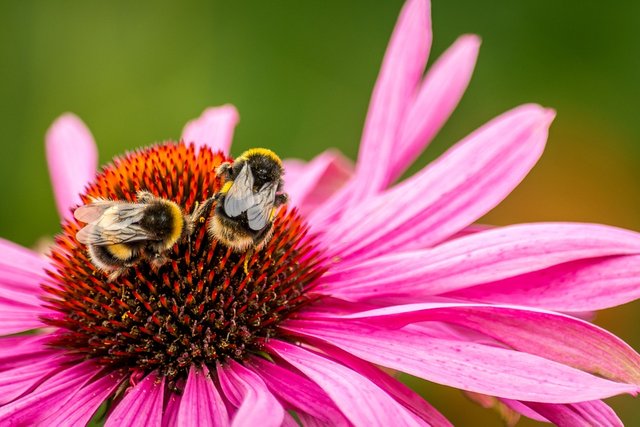
My dad was a fantastic storyteller. He told me about a Society of Sisters dominated only by females. I was enthralled by the splendidly organized society of the City of the Honeybees, and I couldn't wait to hear more!
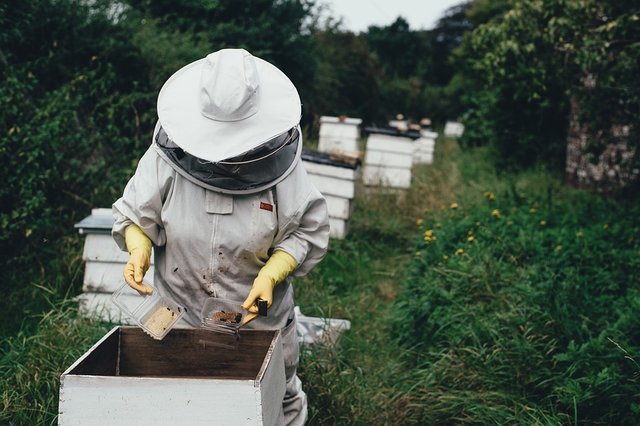
All of the domesticated bees live in hives made of wood with drawers filled with combs of honey. Each hive has a perfectly organized program of work for its 60,000 laborious and tenacious residents. There are two categories of workers: those who stay inside and those who leave the hive.
In the hive, you'll also find a few drones. These are male bees from unfertilized eggs. They don't work and are sooo lazy that a wet nurse has to feed them. Their only duty is to mate with the queen!
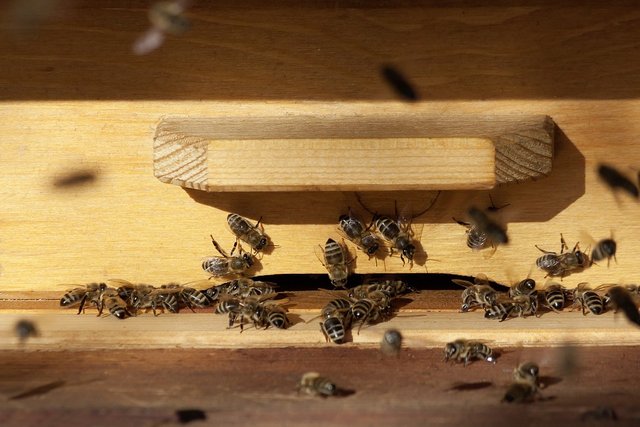
INSIDE the hive you have the cleaning bees that keep the premises clean of residues. Some bees stay at the entrance to insure an adequate circulation of air to the interior, while others are grave-diggers who evacuate dead bees.
Others are building the cells (alveoli) of the comb for the storage of honey. This deliciously scented bees wax is secreted by the glands located under their abdomen. They place the bees wax between their legs (they have six legs), and chew it into little balls. These balls of wax are then transformed into beautiful, hexagonal honeycombs. The honeycombs serve to shelter the young larvae, pupae and honey.
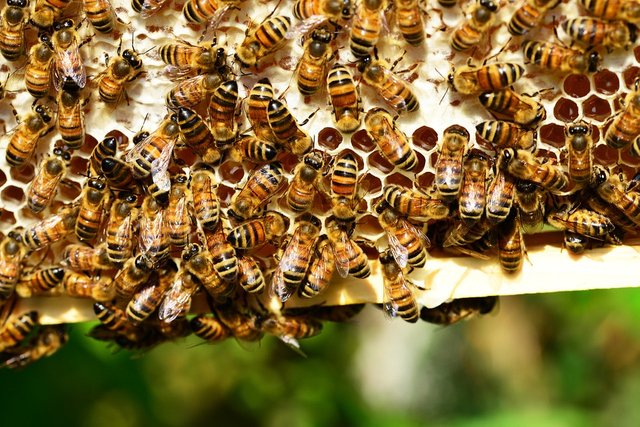
OUTSIDE the hive some of the workers are scouting, and some are collecting pollen and nectar to feed the colony and take care of the offspring. When bees visit flowers for nectar, they brush much of the pollen that powders their bodies into pocket-like structures on their legs to carry home for the larvae to eat.
The nectar is placed in a sort of pouch (only the size of the head of a pin) which they bring back to the hive. Two bees then take the regurgitated nectar and transform it into a substance incorporating two enzymes that they fabricate into honey. The honey is then placed inside the comb, under guard of a sentry. Altogether they can collect up to six pounds of nectar a day!
The queen is the largest female in the hive, and she's the one who lays the eggs. Her sole source of nutrition is "royal jelly", made by the hive's wet nurses from a special gland inside the nurses' heads. It's a rich and nutritious milky-white substance.
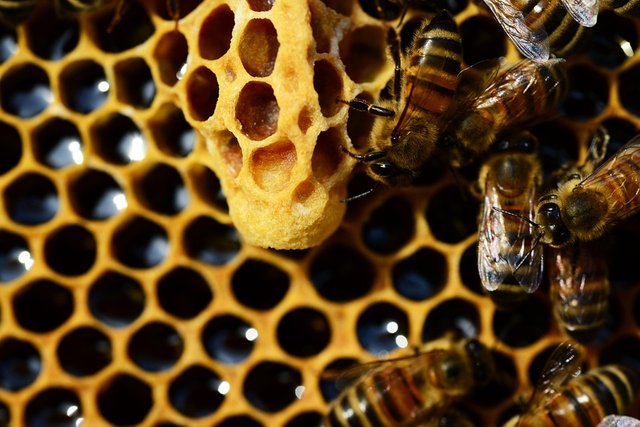
The queen is always served and protected by followers, but they will abandon her without pity if she fails to accomplish her mission of procreation. She's a virtual prisoner in the hive. When she is just two weeks old, she is ready to mate. She'll fly a few miles from the hive, sending forth a strong scent to alert the males (drones) of the colony. Excited, they'll fly behind her.
The queen will mate with several of them, who won't likely survive the intensity of the coupling. She'll be impregnated by some five million spermatozoids. She'll live five years breeding workers, but will no longer mate during that time. When the "wedding" is over, the few surviving drones are pulled out of the hive by the workers, and condemned to die of hunger. If a larger larva is found (which would be that of a future queen) it will be killed.
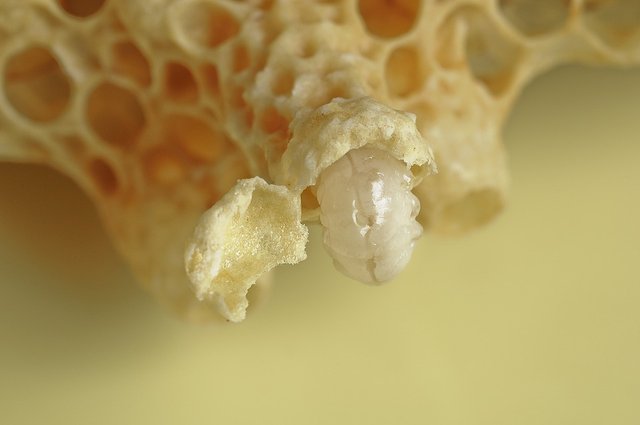
The queen lays her eggs in the "nursery" of the hive, inside the cells of the comb. In two or three days the eggs become small larvae resembling maggots. For two days the wet nurses give them "royal jelly", some honey and pollen. Six days later they become chrysalides (enclosed in a cocoon) and twelve days later the new workers can fly. The metamorphosis lasts twenty-one days.
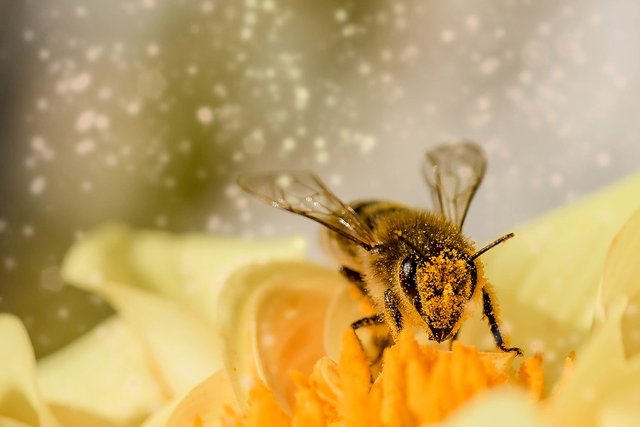
When bees collect the nectar, the pollen hitches a ride on all the right spots of their body which is then released upon the reproductive organs of all sorts of plants to fertilize them. Trees and plants depend upon bees for their pollination.
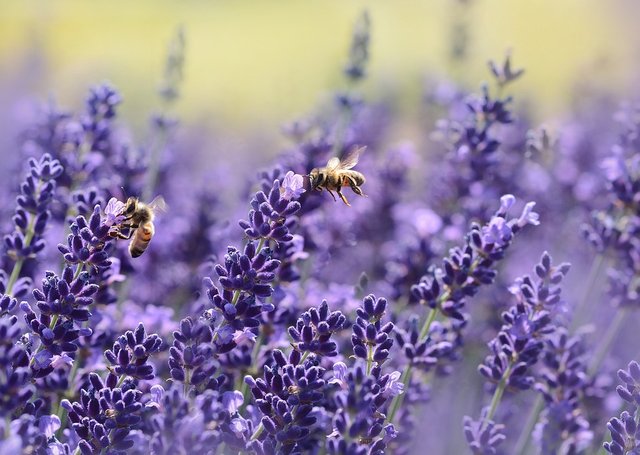
Thanks to my father, I have never forgotten the important role played by the bees in our environment, a role that goes far beyond the production of honey and wax. These diligent bees are exemplars of organization. They deserve our attention and we should protect them. Female honey bees are the only bees which sting, after which they die.
The next time you see one landing on you, don't be frightened. She will not sting if she's not scared. Just be grateful for this magnificent worker, and let her fly back to her City of Sisters!
Who knew? That was one honey of an introduction to these busy buzzy beings. I learned a great deal, so thank you.
And allow me to award you three "A's for your story about "B's"
You are as sweet as honey. Thanks for the three A's, never had this high award in College!
Honeybees are fascinating! The bee was a favorite of Napoleon.
Thanks for sharing the buzz @ampm! 🐝
yes, very interesting story and great reminder of how important bees are to sustaining life around the planet! and now I also feel like some fresh pine honey too! :D
Honey is soo delicious...My favorite is the pine honey, dark and succulent. Thanks Alex.
Oooo... fresh honeycomb is the best! 🍯 🐻 😋
Thanks Michelle for mentioning Napoleon who used the honey bee as one of the great symbols of the power of his empire.
Wow, Nice and interesting post. I never see the "City of sisters" so close... Thanks for share, I just started to follow you :D
Thanks for sharing. Taste some pine honey to appreciate the sisters even more!
Remarkable effort done about the bees. Great informa
Wow awesome captured keep it up @ampm
I appreciate your comment. Thank you.
Honeybees are the most important wheel in nature cycle
Let's not forget it. Thanks
Thanks for teaching me about these beautiful insects.
Bees should be a model for all of us.
Work ethic yes but I’ll take a humans lifespan. 😉
Congratulations @ampm, this post is the fifth most rewarded post (based on pending payouts) in the last 12 hours written by a Dust account holder (accounts that hold between 0 and 0.01 Mega Vests). The total number of posts by Dust account holders during this period was 3145 and the total pending payments to posts in this category was $758.70. To see the full list of highest paid posts across all accounts categories, click here.
If you do not wish to receive these messages in future, please reply stop to this comment.
Congratulations! This post has been upvoted from the communal account, @minnowsupport, by alexpmorris from the Minnow Support Project. It's a witness project run by aggroed, ausbitbank, teamsteem, theprophet0, someguy123, neoxian, followbtcnews/crimsonclad, and netuoso. The goal is to help Steemit grow by supporting Minnows and creating a social network. Please find us in the Peace, Abundance, and Liberty Network (PALnet) Discord Channel. It's a completely public and open space to all members of the Steemit community who voluntarily choose to be there.
If you would like to delegate to the Minnow Support Project you can do so by clicking on the following links: 50SP, 100SP, 250SP, 500SP, 1000SP, 5000SP. Be sure to leave at least 50SP undelegated on your account.
Congratulations @ampm! You have completed some achievement on Steemit and have been rewarded with new badge(s) :
Click on any badge to view your own Board of Honor on SteemitBoard.
For more information about SteemitBoard, click here
If you no longer want to receive notifications, reply to this comment with the word
STOP